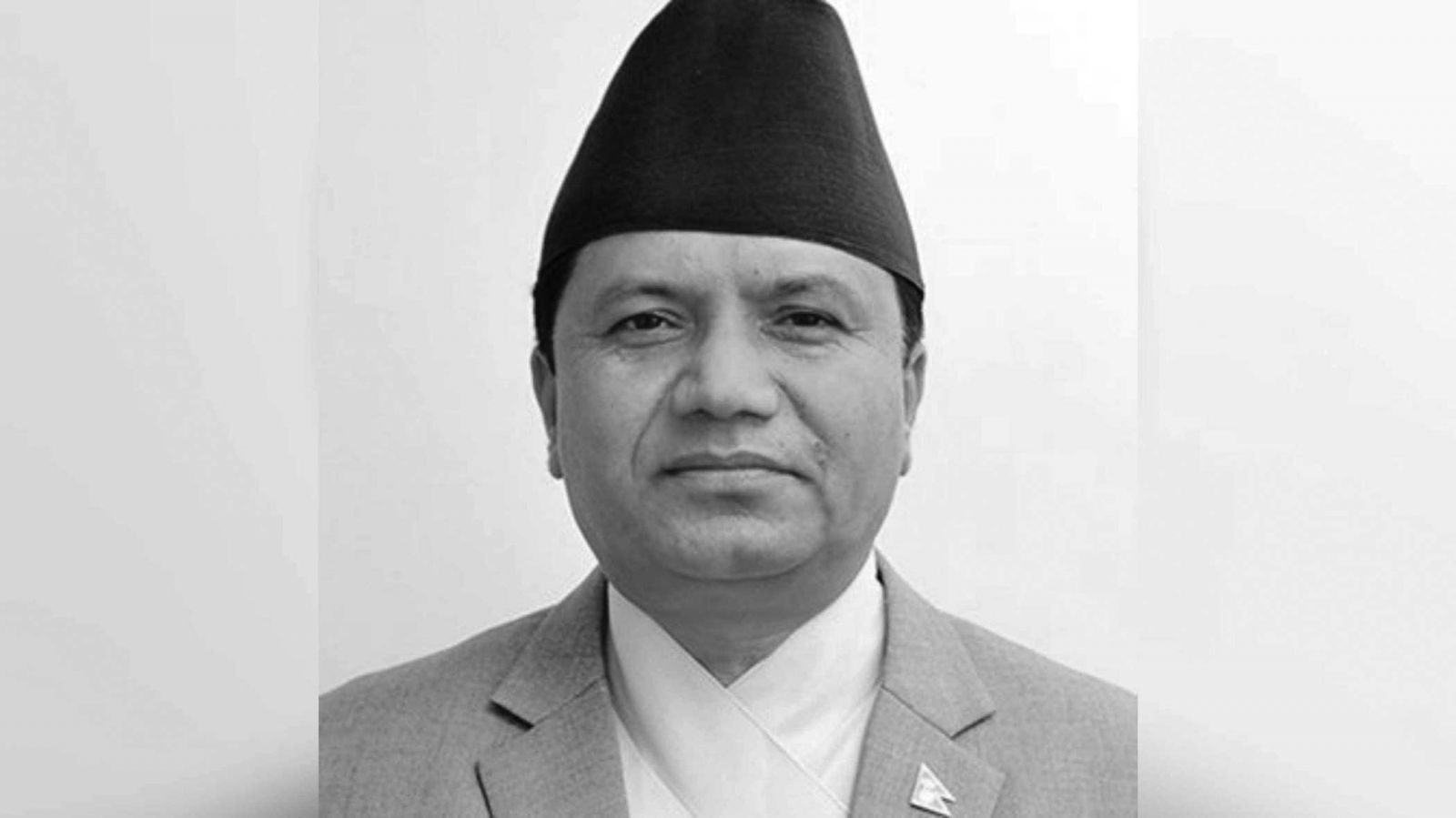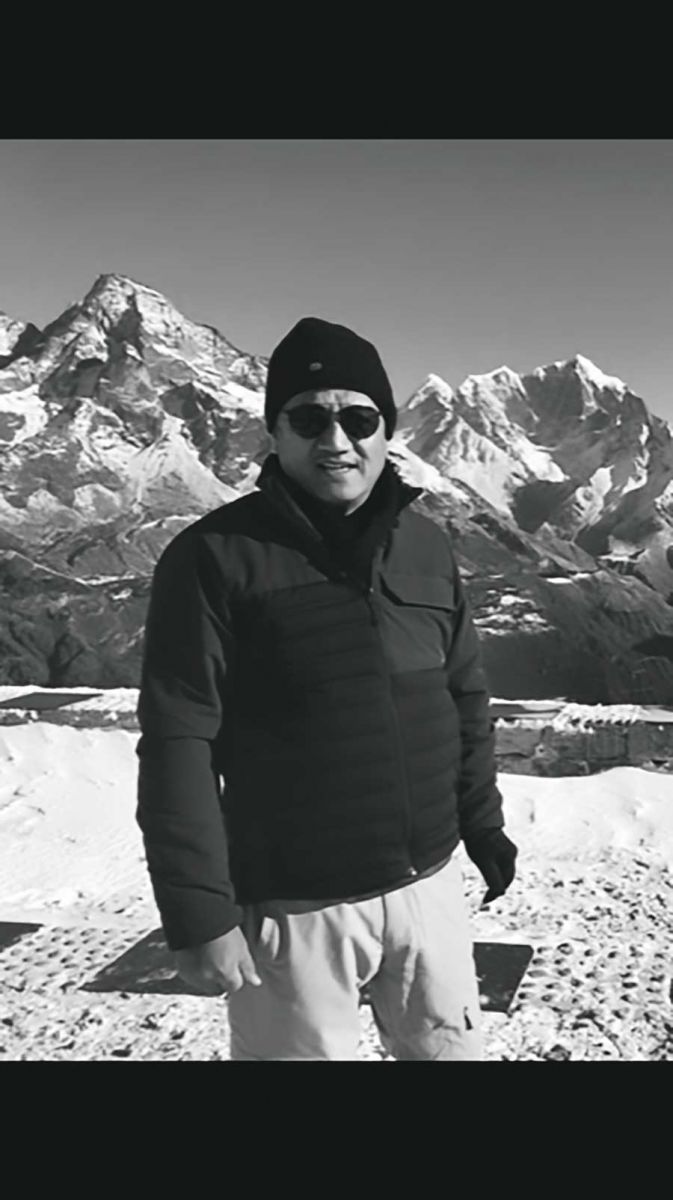On February 27, 2019, a helicopter carrying seven people, including the Minister of Culture, Tourism and Civil Aviation, Rabindra Adhikari, and tourism entrepreneur Ang Tshiring Sherpa, crashed in the area of Sisne Khola, near Pathibhara in Taplejung. Sadly, no one survived the accident. In memory of these two men who have done so much for tourism in Nepal, here, two people who knew them well share their memories.
Remembering Rabindra Adhikari, Minister of Culture, Tourism and Civil Aviation
by Deepak Raj Joshi, CEO Nepal Tourism Board, as told to ECS Staff
 He was probably the most dynamic and positive personality of our political leaders; I have known him for about 12 years. Even when he was younger he was very active, and he made a couple of interesting changes that show how influential he was. He was from Pokhara, and he became president of the student union of Pokhara University, which at that time was the biggest campus of Nepal, student number-wise, and then he became president of the student union of Tribhuvan University. He brought in discounts for students with ID cards on public transport, which was his initiative.
He was probably the most dynamic and positive personality of our political leaders; I have known him for about 12 years. Even when he was younger he was very active, and he made a couple of interesting changes that show how influential he was. He was from Pokhara, and he became president of the student union of Pokhara University, which at that time was the biggest campus of Nepal, student number-wise, and then he became president of the student union of Tribhuvan University. He brought in discounts for students with ID cards on public transport, which was his initiative.
One thing that still inspires me, he was very active all the time, from morning to evening he had so much energy—it never decreased throughout the day.
Another thing is, most leaders, especially leaders of developing countries/economies, they talk negatively about others, be it other parties or other groups of parties, they criticize others; but that was not in him. He never talked negatively about others.
He also always used to encourage everyone, from every sector, like if he met somebody who is a singer, he would say, “Oh you sang very well, keep on singing; you are going to be very good!” He used to encourage every person to do more, to do it better. So, that is also a very unique thing I found in him.
He was the chairman of the Development Committee of parliament, and after the earthquake, tourist numbers were very low, even the movement of domestic tourists was very, very, low. The earthquake had mostly affected Kathmandu and its surrounding districts, but of course, tourist arrivals were very low in Pokhara and Chitwan also, which had not sustained damage. So, he did something very unique and innovative: he held those committee parliament meetings in Nagarkot and Pokhara; before they were only held in Singha Durbar. But, he took them outside of Kathmandu just to give the message that destinations were ready and able to host meetings and conferences, and we should have them in those areas.
He also wrote a book, Samriddha Nepal (Prosperous Nepal), and in that book he shared a vision of how to develop the country in tourism, in infrastructure, in IT; he highlighted different sectors. Normally, politicians are more concerned about social and political agendas, but he was more into the development agenda, so that is also very rare thing about him. Regarding development, he was an extreme believer and practitioner of the principle: politics for development. Politics for nothing else. That was his vision that he always followed.
And he was not limited and confined within his party and party cadres. He was beyond that. If you talk to many other party leaders and supporters, you will find that he had respect from all segments, all walks of life, civil society, media, and even the other party activists. When he became minister, he had the idea to formulate a think-tank group so that he could get advice and suggestions. And categorically he asked me not to decide on people based on if they were close to his party or close to him or Pokhara, his constituency; but just to think about who were capable to give good suggestions. He asked that the selection be completely unbiased and professional.
I remember he was very focused on development and improvement of the airport, because that’s the key for our tourism. The growth of the Lumbini airport was less than 30%; now it has progressed by more than 75%. He had even more knowledge than the officials of the Civil Aviation Authority, he knew how big the pitch is, what is level of blacktopping, what is the progress, all the minute details; whenever he met an employee from the aviation sector, he would ask him nothing else. “How is the progress, is there anything I have to do?” So, he had that kind of energy and positivity.
Personally, I think he was a kind of personality that cannot be replaced by others, very charismatic, a very different kind of person. I have seen many politicians within our country: he was really different.
I think it will be a true tribute if we can fulfill some of his visions. So, I am trying to focus: specifically, we are lobbying for the completion and improvements of these airports: that is not my direct area, but I will keep on lobbying with the government, bureaucrats, and politicians. And secondly, he had a vision that we shared, of making our heritage sites unique nighttime experiences. That was an area he wanted to make changes in, hopefully in a few months’ time, we’ll be having nighttime visits to our heritage sites.
He was minister for around 11 months. In this very short time period, he did quite a lot of things. For example, so many heritage sites were damaged after the earthquake, but once he took over, we saw very good progress; Swayambhu was completed. He was interested in impact-oriented things, and believed that engaging the youth was very important. Because China is also our priority market, we made a new Chinese-lauguage website; that was his initiative. He gave us a deadline, and in 40-45 days, we are going complete our website in three or four more languages. So, that was also his vision.
He was not only a professional and development-oriented leader, but as a human being also, he was a very good person. And, personally, I believe if you are good as a human being, you can do many things better. And that was the way he was.
Ang Tshiring Sherpa: How I will remember him
by Suhrid Ghimire, Executive Chairman, Continental Trading Enterprises Pvt. Ltd., as told to ECS Staff
 I met Ang Tshring during around 2001: we met over a golf match. I was new to golf, but he was already a good player then. We happened to play together in Gokarna Golf Club, and though in those days I was just a simple player and he was much better, we had good chemistry and got along very well. And then we became extremely close within a very short span of time, say around six or eight months, and we’d meet almost every day or play every day; if not play, then meet in the afternoon for a cup of coffee, or sometimes in the evening for a drink, and so forth.
I met Ang Tshring during around 2001: we met over a golf match. I was new to golf, but he was already a good player then. We happened to play together in Gokarna Golf Club, and though in those days I was just a simple player and he was much better, we had good chemistry and got along very well. And then we became extremely close within a very short span of time, say around six or eight months, and we’d meet almost every day or play every day; if not play, then meet in the afternoon for a cup of coffee, or sometimes in the evening for a drink, and so forth.
I found him a very unusual man. I have come across many kinds of successful people in the world, but he was completely different than any one of them. He comes from a very small village in the north-eastern mountains, and I have no idea about his academic qualifications, but he was so intelligent, he was so consistent with his thought processes, and so visionary, and full of knowledge. I have never seen all the good qualities in one human being like that. I used to respect to him as brother, and subsequently he started calling me dai. We didn’t address each other by name: he used to call me dai, I used to call him bhai. And we kept playing together and became friends more and more.
One thing I liked about him the most is how he knew what kind of business would flourish in Nepal, and more than that, what kind of business would serve the deprived people more than anybody. So many of his businesses were in very remote areas—the mountains—hotels way above 5000 m, like in Kunde and the trekking routes. Even in adverse kinds of situations, he could see the potential of that area, he could see potential for his own business, as well, to improve the livelihood of the people around there.
You know, he is the only person in Nepal who is involved in five airlines. It is very interesting: Tara Air, which operates in the mountain regions, Yeti operates intercity, Dynasty Air and Altitude Air, two helicopter services, and Himalayan International Air, that he was the chairman of. You see, one person, coming from a remote part of Nepal, comes to Kathmandu and then becomes the owner of five airlines! Maybe some of them only partly, but still, it’s an amazing story.
And he was always talking about something new. Every time we met, he had new ideas. One of his last ideas, shortly before he passed away—he is a Buddhist, and he told me that he was going to Khumbu Mela, a big Hindu festival close to Varanasi—I was surprised, but then he told me he went there to see one kind of very luxurious tents put there for high-end tourists. And he came back after seeing them, and he decided to put up some of those tents inside our golf club, deep inside the forest, very secluded, for people to stay away from all this hustle and bustle. And, he could see business there; he also talked about putting them up in Kailash, Mansarovar.
Though he was a Buddhist, he used to respect Hinduism very much. Whenever we used to talk to him, he used to give examples from Mahabharat, Ramayana, he has read all of them, and not only once, a couple of times, and he could quote examples from these texts at appropriate times. He would tell me, “I learned this from the Mahabharat or Ramayana.” He’s an amazing person.
He was also real visionary person, as I told you. He was running around 30-odd organizations already and had 20 or 30 more in the pipeline. One simple human being was thinking that fast. When he shared his thoughts with us, it was difficult for us to believe, but then he used to make it happen, and successfully. He was that kind of person.
He is probably one of the few golfers in Nepal who became single-handicapper within a year’s time. I heard he was one of the top snooker players in Nepal, then he left snooker, took up golf, and became one of the top golf players…
I mean, whatever he used to do, he did it with sincerity and total focus.
There are many positive things about him: his memory was extraordinary. I have never seen him referring to a contact list on his mobile phone: he used to dial the numbers; most of the time, he stored all the numbers in his brain.
And. he used to personally know thousands of people from the remote Himalayan areas, he used to call them, he knew them all, and I have never come across that level of memory in anyone. He was also very supportive, if he came across any friends who had problems. For example, there is a groundskeeper at the Royal Nepal Golf Club near the airport, and this man’s daughter wanted to play golf, and he supported her entirely; she is learning golf in the U.S.A. now, probably she will be a top golfer one day. Whenever we play a practice round at the airport golf course, you come across a small hut where they lived, and he never forgot to go inside and ask, “Is there anything you need?” Whether for them or their daughter; he took care of even the small things.
And yet he knew all the ministers, he had those kinds of relationship—from the top to the bottom, with people everywhere at every level. He helped many people who were deprived, who didn’t have proper connections and all. And, even if friends had hurdles in their business, he would personally call; he was a very helpful personality, he tried to help everyone. Also, his communication skills were extraordinary, in both English and Nepali.
To run such a big empire, he had a vision, but he didn’t work by himself. To carry it out, he created a very good team, a wonderful team. There will be no problem to carry on the businesses they already have, they will be in a good place, run well. But, to implement the ideas he had, it may not be as good as he would have done it.
I still haven’t gotten over it: a person you meet nearly every day, for 17, 18 years, we were so close and playing together, drinking together, golfing together.
So, the nation has lost a big treasure, a very visionary treasure. The number of visitors I have seen in those five-seven days at his home [after his death]: the prime minster, almost the entire cabinet, diplomats, some of whom didn’t even know him, but had heard about him. I saw thousands of people at the funeral. Everyone liked him.











